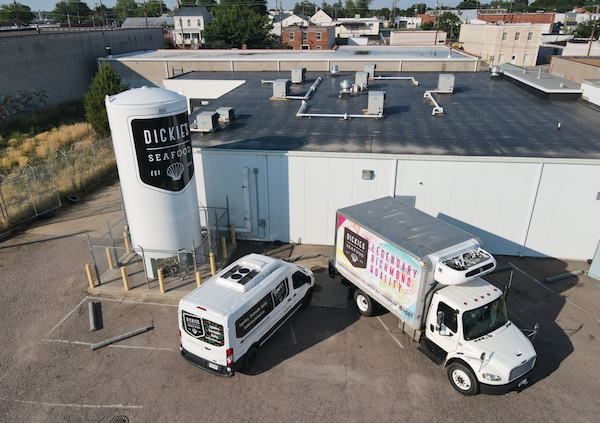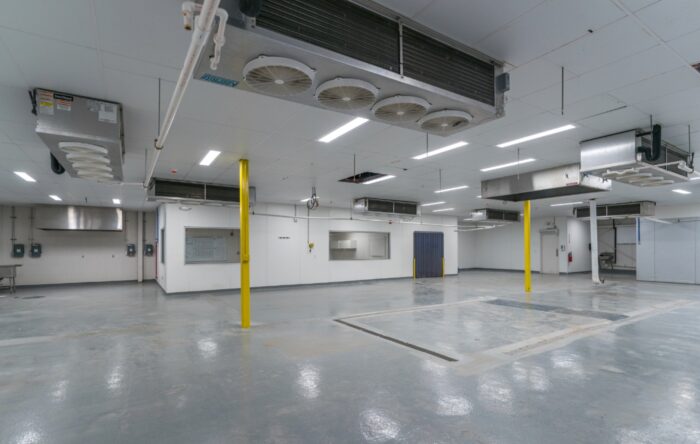A local company that’s used to hauling and storing automobiles is dipping its toe into the cold storage business.
Henrico-based Sweetie Boy Transportation recently bought the 16,000-square-foot building at 1508 Brook Road that was formerly home to now-shuttered seafood wholesaler Dickie’s Seafood.
Sweetie Boy owner Tyler “Sweetie Boy” McCormick said the company is set to use the building as a temperature-controlled cold storage facility, a first for the firm since its founding 15 years ago.
Now, as Sweetie Boy Cold Chain, the old Dickie’s building will store wholesale frozen or refrigerated foods for restaurants and other food businesses that might not have the room themselves, McCormick said.
“If you are a small restaurant and you’re able to nab a good deal on a bunch of wholesale frozen or refrigerated foods, obviously most, at least Richmond city restaurants, do not have that kind of space. We can offer that storage for as long or as little time as needed,” McCormick said.
McCormick started Sweetie Boy in 2010, which today moves over 2,500 vehicles weekly for dealerships, rental companies and auction houses. Headquartered at 4001 Carolina Ave. near Richmond Raceway, the company has six “hub” locations across the East Coast, and two satellite locations in Montreal and Toronto.
The Sweetie Boy Cold Chain building will be officially open for business starting July 1, McCormick said. The company will facilitate transport and pick-up of frozen or refrigerated goods to and from restaurants and ghost kitchens across the Richmond metro area, he added.
There is currently no specific coverage area for who can store their goods in the Brook Road facility; McCormick said “anyone who needs cold storage” in the Richmond area and beyond can be accommodated.
McCormick said pricing for storing cold goods in the facility will be based on how many square feet is needed, with a “pay-per-foot” model. He said that 15,000 square feet of the facility is available space for customers to store food.
McCormick said the facility will accommodate everything from a single box of frozen or refrigerated food to less-than-truckload and full truckload pallets of frozen goods. The facility can also store utensils and paper products.
When the Dickie’s building became available, McCormick said he originally intended to purchase the building to do some meat processing independent of Sweetie Boy, but seeing a need in the area, decided to use the space for Sweetie Boy’s first cold storage facility.
“Competition is limited in the Virginia market, especially for local small restaurants, and small distributors that need space as needed. So, I think this will fit the bill,” he said.
McCormick started the process to purchase the building last June, but ran into some legal issues buying the building which slowed the process down. He declined to comment further on those issues, but noted that Dickie’s Seafood remained helpful throughout the process.
The purchase ultimately closed on Jan. 2 of this year at a price of $1.5 million.
Besides some painting and cleaning and replacement of some freezer doors, the move was practically “turnkey” for Sweetie Boy, McCormick said, due to the building’s previous use for seafood storage.
With all of Sweetie Boy’s other facilities being paved lots with a small office, the large warehouse is certainly a change for the company, McCormick said.
“This is going to allow us to diversify our holdings and our portfolio. We store cars in eight locations on the East Coast and Canada, we might as well start to be able to store your bananas as well,” he said.
He added that the new cold storage facility is the first step in a vision for Sweetie Boy to get more into warehousing and cold storage. The new Sweetie Boy cold storage facility will create seven new jobs in the region in the first 60 days after opening, McCormick said.
Sweetie Boy Transportation currently has around 270 total employees.
Dickie’s Seafood rebuilt its facility at the Brook Road location in 2021, after a fire gutted it in June of 2020. The company spent $5 million to relaunch the facility, but closed last year, with Dickie’s CEO Frank Fay noting that a combination of fire-related factors, insurance legal battles, COVID-19 effects and consumer inflation led to the closure.








